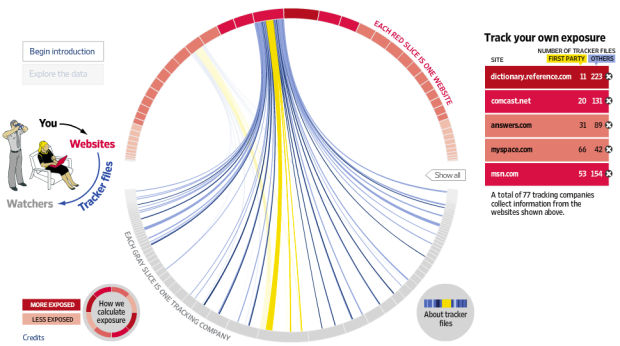Andrew Garcia Philips and Sarah Slobin (plus five data gatherers) of The Wall Street Journal report on the prevalence of trackers and cookies on the fifty most popular U.S. websites:
Marketers are spying on Internet users — observing and remembering people’s clicks, and building and selling detailed dossiers of their activities and interests. The Wall Street Journal’s What They Know series documents the new, cutting-edge uses of this Internet-tracking technology. The Journal analyzed the tracking files installed on people’s computers by the 50 most popular U.S. websites, plus WSJ.com.
Websites (top half) and tracking companies (bottom half) are placed in the circular network diagram. Roll over a website, and lines flare out to the tracking companies that collect data about you on that site. Similarly, roll over a tracking company to see what sites they sit on. Lines are color-coded to indicate first-party tracker files and third-party ones.
Select a specific company for a more detailed breakdown and a brief explanation of the company’s privacy policy, what you can and cannot opt out of. For example, this is the view for Dictionary.com, which by far has the most trackers (234 of them total) out of the fifty sites.
![]()
There’s some clean, well-thought design and detailed reporting going on here by WSJ. You almost expect a piece this hefty to be clunky in the interaction, but everything works as expected. Take a look at the interactive (or the methodology) for yourself. There’s a lot going on and interesting tidbits to explore.
How do you feel about all these companies collecting data about you, what you’re browsing, and what you click on? I personally am okay with it – as long as it’s anonymized and improves my browsing experience (i.e. ads that are relevant to me).


 Visualize This: The FlowingData Guide to Design, Visualization, and Statistics (2nd Edition)
Visualize This: The FlowingData Guide to Design, Visualization, and Statistics (2nd Edition)

Pingback: Personal Details Exposed Via Biggest U.S. Websites | Bible Prophecy In The News
What is this type of visualization called?
Pingback: Company place trackers on your computer and sell you web search activity. « Rodneo's Blog
Interesting, but not surprising and maybe you should then visit this link next to update your assumption of anonymity: https://panopticlick.eff.org
“I personally am okay with it – as long as it’s anonymized and improves my browsing experience” … But that’s NOT the point. They’re tracking this because info about you — YOU specifically — your tastes, interests, preferences and habits is VERY valuable and saleable.